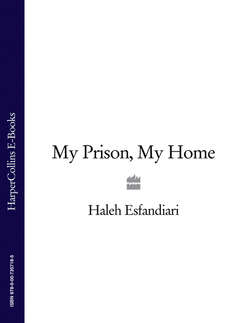Читать книгу My Prison, My Home - Haleh Esfandiari - Страница 7
LIKE A REFUGEE
ОглавлениеAlthough I was frightened and disconcerted, my mind was also focused on practical matters. I asked my mother to phone my sister, Hayedeh, in Vienna and my husband, Shaul, in Potomac, Maryland, outside Washington, to tell them what had happened. I also asked her to call my travel agent and have him cancel my ticket.
I got out of the car and stood by the side of the road, staring down the dark, empty highway. I was buffeted by conflicting emotions. I was grateful I hadn’t been kidnapped, injured, or killed. Like every other visitor to Tehran, I had heard of people being abducted from their cars or homes and held for ransom; I had heard of the armed robberies, which had increased in recent years. I had also read of Iranians being beaten up and thrown, half-dead, into alleys—the ugly handiwork, it was thought, of the secret police. But I was still in one piece. I had not been knifed by my assailants. They had not hit me, broken my jaw. I was grateful to be alive.
But I had lost all of my belongings and money. Worse, I had lost my Iranian identification cards and my Iranian and American passports. I dreaded the many days of red tape and bureaucracy that I knew lay ahead. I felt like a refugee from some war-torn country, without papers, without proof of identity, unable to travel. Despite my wool coat with its fur collar, I was cold and numb. I was astonished that not one of the cars that drove by stopped to offer help, but prostitution is rampant in and around Tehran. They probably think I am one of them, I thought ruefully, standing on a highway in the middle of the night.
I was startled when two men emerged from behind the bushes along the island dividing the highway. They, too, seemed to be wearing olive drab outfits. They spoke quietly to Modarress. Then, as suddenly as they had appeared, they left. I asked Modarress who they were. “They are members of the highway patrol,” he said. I thought it strange that their outfits were seemingly identical to those of the men who had just robbed us. Besides, I had never heard of a highway patrol appearing on foot. I said as much to Modarress. He did not reply.
It took an hour for a police car to show up. Two officers, neat and businesslike in their uniforms, motioned for us to get into the back of the police car. I had been standing on the highway with Modarress as we waited for the police, not wishing to sit in our car after the robbery. I was now grateful to be out of the cold, but Modarress, mindful of Iranian protocol, preferred to stand outside and answer the officers’ questions through the window. As we gave a detailed account of the robbery, the policemen shook their heads, as if in disbelief. They exchanged glances when Modarress described the make and color of the car and the clothes our assailants were wearing, but they continued to take notes and said nothing. They asked for and wrote down the usual particulars: my name, address, date of birth, place of birth, ID number, contents of suitcase, carry-on bag, and purse. They had me sign the completed report, gave me a copy, and told me to take it to the police station at Shahrak-e Gharb, a seven-minute car ride from Mutti’s apartment. I didn’t know how we were going to get to the police station or home, since Modarress had surrendered his car keys during the robbery. But Modarress said he kept a spare key in the car, and we drove off.
At two-thirty in the morning, the police station had an abandoned look to it. A sleepy guard registered our names and took away Modarress’s cell phone. The sole officer on duty seemed uninterested in our story. “There is no one here,” he said, sweeping his arm across the empty room, as if we needed convincing. “Go home and report back first thing in the morning.”
All the lights were on in my mother’s apartment in the otherwise dark building. The caretaker let me in. I sent Modarress home and told him to come back at seven a.m. He said he would go back to the scene of the robbery to look for my Iranian passport and papers, since it was quite common for thieves to take the money and valuables from a purse and throw everything else on the side of the road. He thought they would keep the American passport.
In the apartment, my mother was fully dressed, waiting for me. We embraced and repeated, more than once, that the important thing was that I was safe. I called Shaul and Hayedeh. I still thought this was a simple robbery, and Shaul agreed with me.
It was nearly dawn. Mother took two pills and went to bed. I collapsed on a sofa and dozed off in a fitful sleep.
